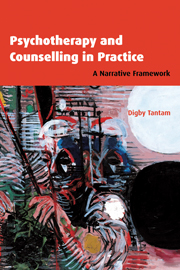Book contents
- Frontmatter
- Contents
- Preface
- A note on terminology
- Acknowledgements
- Introduction
- 1 Establishing the concerns
- 2 Values
- 3 What life means. Emotional flavour
- 4 Narrating the treatment: the formulation, reformulation and therapeutic contract
- 5 Narrating the self
- 6 Procedures for gaining relief
- 7 Resolution: finding out what's doing this to me
- 8 Universal technique for resolving predicaments
- 9 Relinquishment and releasement: changing something about me
- 10 Re-narration: finding happiness
- 11 Crises, and how to surmount them
- Appendix: confidential record
- References
- Index
10 - Re-narration: finding happiness
Published online by Cambridge University Press: 06 November 2009
- Frontmatter
- Contents
- Preface
- A note on terminology
- Acknowledgements
- Introduction
- 1 Establishing the concerns
- 2 Values
- 3 What life means. Emotional flavour
- 4 Narrating the treatment: the formulation, reformulation and therapeutic contract
- 5 Narrating the self
- 6 Procedures for gaining relief
- 7 Resolution: finding out what's doing this to me
- 8 Universal technique for resolving predicaments
- 9 Relinquishment and releasement: changing something about me
- 10 Re-narration: finding happiness
- 11 Crises, and how to surmount them
- Appendix: confidential record
- References
- Index
Summary
Sophie---Psychoanalyste
« Pour plus de jouissance »
Tel. 01 ………
Advertisement in Psychologies magazine 173, March 1999What is Sophie offering? And is it anything to do with health? In an illness-led service such as the British NHS, happiness seems like an accidental consequence of lack of illness, rather than something for which the doctor could, or even should, aim. Happiness might be the stuff of escapism, of Mills and Boon fantasy, or of religious zealotry, but not of the clinic or everyday life. Or so it might seem. Argyle (1997) has argued that happiness is an important determinant of long-term health. Happiness is also the single most important determinant of quality of life according to a panel of UK residents brought together to develop the WHO International Quality of Life instrument (Skevington, Mac Arthur & Somerset, 1997).
How important happiness is, what constitutes happiness, and whether or not its absence should make us change our lives, are all questions that can only be answered in relation to our personal values. What to a psychotherapist might be hedonism might to his or her client be the activity that makes life worth living.
Stories of happiness
Long-term therapy requires some theory of what it takes to be a person – a theory of human nature (Trigg, 1999).
- Type
- Chapter
- Information
- Psychotherapy and Counselling in PracticeA Narrative Framework, pp. 231 - 266Publisher: Cambridge University PressPrint publication year: 2002

